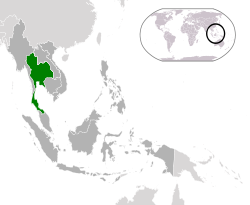Can The Empire Strike Back?: US, China And U-Tapao – Analysis
By IPCS
By Narayani Basu
Details of a recently unveiled strategic review by the Pentagon have revealed the direction of the Obama administration’s rebalancing in the Asia-Pacific. While some have taken the news fairly positively, it is certainly raising concerns from others, including China – undoubtedly one of the growing military powers in the region, though it is still a long way off from being at par with the US. America’s latest move has been to set up U-Tapao, a military airbase in Rayong, Thailand, as a hub for humanitarian and disaster relief. The decision was cancelled after the Thai government postponed its decision to approve the project until August 2012. Given China’s own clout in the region, and the fact that the US and Thailand have been treaty allies since 1954, what can be the possible implications for bilateral relations between the concerned countries, in the Asia-Pacific theatre?
The problem

The National Aeronautics and Space Administration (NASA) deems the base to be suitable for a six week atmospheric research study in August and September 2012. The effect of carbon emissions on the atmosphere and monsoon rains will be studies as part of the project.. Apart from this, the Pentagon also held high-level discussions with Thailand in 2011 in preparation for using the base as a regional humanitarian assistance and disaster relief centre, in order to better respond to future natural calamities. However, both the US embassy and the Thai government itself have done a poor job of introducing the proposals to the public. As a result, domestic politics has entered the breach, building a controversy virtually out of thin air.
American rationale
It is no secret that the US is majorly rebalancing its foreign policy strategies in the Asia-Pacific. In May 2012, Defense Secretary Leon Panetta announced plans to shift nearly sixty per cent of American naval forces to the Pacific region by 2020. The subsequent moves are said to be the latest in a series of efforts to maintain America’s presence in the region. Rebalancing is a tactic to maintain American access and influence in the region. American security analysts argue that the effort is about strengthening alliances in the region – an intersection of interests and needs that will enable the alliance to strengthen with time. The key here is to keep all such alliances more flexible and more politically and strategically viable for the smaller countries of Southeast Asia.
Reactions
While some security analysts see the recent American move in the Asia-Pacific theatre as part of a long-term effort by Washington to strengthen existing ties in the region, others, particularly Chinese security analysts, do not agree. Domestic politics within Thailand have also blown the controversy out of all proportion. Opposition lawmakers have argued that Prime Minister Yingluck Shinawatra needs to read the fine print of the American proposal, lest it compromise Thai sovereignty. What has more potential for disaster, critics argue, is that were such a proposal to work out, relations with China could be compromised. Not only this, but the arrangement could signal American intentions to ramp up its military presence in Thailand in order to counter China’s influence in the region, and that NASA planes could be additionally used for espionage.
Conspiracy theorists within Thailand go so far as to say that this could be a quid pro quo scheme between Thailand and the US. According to such a proposition, Prime Minister Yingluck would grant American access to U-Tapao, in order for her older brother, the exiled former Prime Minister Thaksin Shinawatra, to receive an American visa in turn.
On a broader canvas, China does not seem to be unduly concerned about the brouhaha over U-Tapao. Certainly no official opposition has been made, with the China Daily going so far as to state that the ’United States is more than welcome, so long as it plays a constructive role’. However, when Foreign Minister Surapong Tovichakchaikul visited China in July, the issue was raised by his Chinese counterpart.
The situation as it stands: What lies ahead
China’s official stand at this point is that while the proposed NASA project itself is not worrisome, Beijing is certainly concerned about the US Defence Department’s request to base a regional humanitarian assistance and disaster relief (HADR) centre at the airbase. Therefore, Beijing ispleased that Thailand had considered its feelings about the NASA project. This also comes in light of the recent diplomatic standoffs in the South China Sea with both the Philippines and Vietnam – issues which Beijing will hope to keep separate from this new controversy.
America continues to maintain that there is nothing sinister about either a regional climate change study project or a HADR centre, but that it is interested in the region because it wishes to strengthen its alliances with the smaller countries of Southeast Asia.
Thailand is caught between the devil and the deep blue sea, sandwiched as it is between two large rivals. While it certainly does not want to antagonise China, its ties with the US date back to the Cold War. Therefore, if there are merits of having U-Tapao developed as an HADR centre, they should be made very clear.
